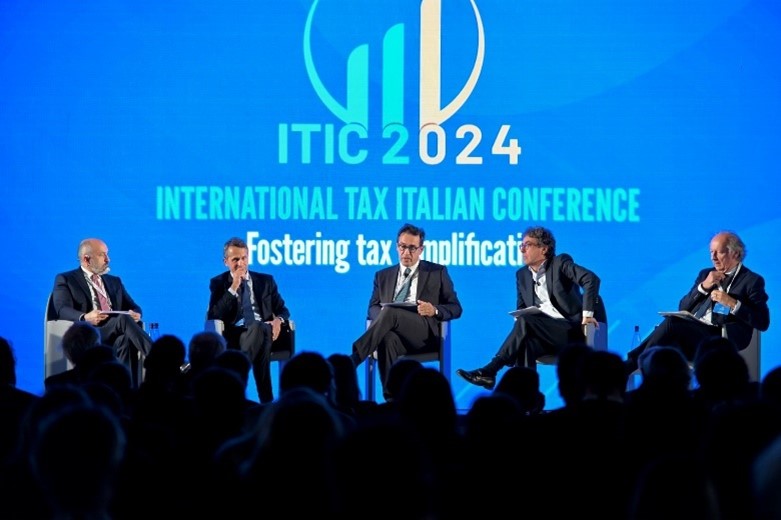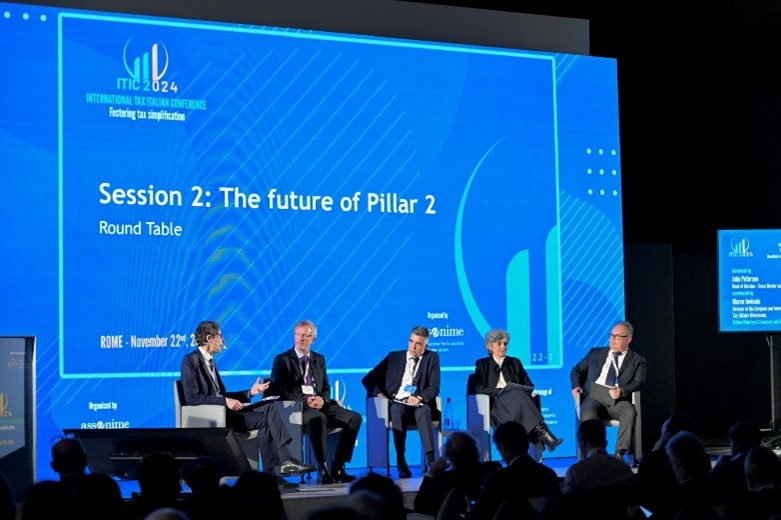On 22 November 2024 more than 300 tax experts gathered in Rome for the first Italian International tax conference organized by Italian Association of Joint Stock Companies (Assonime). Under the patronage of the OECD, the European Commission and the Italian Ministry of Economy and Finance (MEF), the event brought together business representatives and institutions to discuss recent trends in international taxation.
Stefano Firpo, Managing Director of Assonime, emphasized the importance of gathering multinational enterprises (MNEs) and institutions to discuss the current architecture of international taxation, while Alberto Trabucchi, Co-Managing Director and Head of the Tax Department at Assonime, highlighted that the proliferation of actors in the international tax landscape could potentially lead to overlapping guidelines and increased complexity, negatively impacting businesses. Fabrizia Lapecorella, Deputy Secretary General of the OECD, provided further insights into the work done by the OECD and the future endeavours of the OECD Inclusive Framework. She underlined the international tax challenges associated with the increased mobility of individuals, particularly High-net-Worth Individuals (HNWIs), and the importance of increasing tax certainty and reducing tax inequalities, including through collaborative tools. Finally, she reiterated the revenue forecasts for Pillar 2 ranging between US$155-192 billion per year.
The event was divided into three sessions, each followed by roundtable discussions: recent trends in international taxation, the future of Pillar 2, and tax certainty, dispute resolutions, and cooperative compliance.
Recent trends in international taxation
The panel discussion was introduced by Benjamin Angel, Director for Direct Taxation, Tax Coordination, Economic Analysis, and Evaluation at the European Commission. He outlined upcoming tax initiatives noting that the priorities will be decided by the new European Commission, such as the revision of the Energy Taxation Directive, the BEFIT proposal, the ATAD 3 Unshell Directive, the revision of EU legislation and directives (so-called decluttering), and initiatives to facilitate SMEs’ activities. He further pointed out that following the Recovery Plan, Cyprus and Malta have revised their tax systems and introduced withholding taxes on certain outbound payments as well as the arm’s length principle. The session featured a roundtable discussion moderated by Alberto Trabucchi with Giorgio Bigoni (Head of Tax, Eni S.p.A.), Paolo Ricca (Tax Director Southern/Eastern Europe, Unilever Italy Holdings S.r.l.), and Giuseppe Zingaro (Head of Group Tax, Unicredit).
The panel discussed the need for a balanced policy framework that supports investments, particularly in light of new measures such as Pillar 2, BEFIT, Pillar 1, and the digital services tax (DST). It was noted that there is uncertainty surrounding the new US administration’s stance on Pillar 1 and Pillar 2. This includes consideration of the global tax environment and the roles of various international actors, such as the contributions of the UN and EU to the international tax landscape.
The future of Pillar 2
The panel discussion was introduced by John Peterson, Head of Division – Cross Border and International Division at OECD. He provided updates on the current and future works on Pillar 2 by the OECD, also mentioning that integrity measures will be published soon. The session featured a roundtable moderated by Marco Iuvinale, Director of European Economy and Finance, with Alessandro Bucchieri (Head of Tax Affairs Enel Group), Antonella D’Andrea (Head of Tax, Leonardo S.p.A.), and Fabio Materassi (Global Tax Director, A. Menarini – Industrie Farmaceutiche Riunite S.r.l.).
The panel noted that there is overlap between certain BEPS measures (such as CFC regulations, interest deductibility limitations, and hybrids) and Pillar 2. While Pillar 2 aims to enhance transparency and accountability, its initial implementation phase is overly burdensome due to extensive information collection, complex calculations, and the need for coordination between relevant legislations. This determines the need for permanent safe harbours that would alleviate the compliance burden and complexity associated with Pillar 2.
Tax certainty, dispute resolutions, and cooperative compliance
The panel discussion was introduced by Vincenzo Carbone, Deputy Director General and Director of Taxpayers’ Compliance and Enforcement Department at the Italian Revenue Agency. He highlighted the positive developments regarding Advance Pricing Agreements (APA), which tripled between 2019 and 2023, reaching 163 last year, and Mutual Agreement Procedures (MAP), with more than 1,700 closed since 2017 and more than 40 countries involved. The same goes for cooperative compliance, with 148 applications and 115 companies admitted, and if only the lowering of access thresholds (currently 750 million) is considered, the target could be extended to 3,200-3,500 companies, and with the approach of 100 million euros from 2028, the target could be 9,200 companies. The session included a panel discussion led by Guglielmo Maisto, President of IFA International Fiscal Association, with Vincenzo Delmonaco (Global Head Tax Controversy and Risk Management, Philip Morris International), Angelo Garcea (Co-Head of Tax Department, MNEs Tax Strategy Director, Assonime), and Pamela Palazzi.
The panel noted that taxpayers extensively use dispute resolution procedures, finding them effective for resolving double taxation issues. The EU Directive on dispute resolution has also been beneficial, contributing positively to the resolution of such disputes. It was noted that Italy introduced an innovative dispute prevention and resolution provision as part of its Pillar 2 implementation strategy, based on the principle of reciprocity. Overall satisfaction with the Italian cooperative compliance programme was expressed by panellists, emphasizing its role in reducing uncertainties and improving transparency.
Closing remarks
The conference concluded with closing remarks from Maurizio Leo, Deputy Minister of the Italian Ministry of Economy and Finance, who presented the work done so far by the current government, with the adaptation of Italian tax legislation to the ECJ jurisprudence and OECD recommendations, the updating of the rules on the tax residence of individuals and legal entities, and the introduction of the GloBE rules.
Key takeaways
The event marked the first ever of this type in Italy and was a useful opportunity to foster a frank exchange of views among policymakers. It is clear that we live in a time where geopolitical uncertainty and the ensuing lack of predictability are on the rise, coupled with the disruptive impact of technology. It is crucial that international taxation evolves in a manner that is closely aligned with business developments. The European Union, in particular, must enhance competitiveness by formulating policies that attract and sustain investment over the medium to long term.
The event underscored ongoing challenges and complexities in international taxation:
- Proliferation and Overlap: The international tax landscape is becoming increasingly complex, with overlapping initiatives from various entities such as the OECD, the EU and the UN.
- Pillar 2 Challenges: Pillar 2 risks losing its global nature, facing significant implementation challenges and high compliance costs. The key item to watch is the entry into the force of the UTPRs.
- Need for Simplification: There is a strong need to simplify and declutter the overall tax system to reduce the burden on multinational corporations, at least those subject to the GloBE rules.
- Cooperation: Continued cooperation and strategic investments are essential to navigate the complexities of international taxation effectively.
Regarding Pillar 2, there is uncertainty regarding whether the new US government will continue to support the project. The UTPR is strongly opposed, and it is unlikely the US will accept a mechanism that could affect its tax bases. On the other hand, the Global South, supported by China, is increasingly influential, as seen in recent G20 positions. These countries are less interested in a minimum tax and more focused on rebalancing the allocation of taxing rights, which they believe are unfairly skewed towards developed countries. UN proposals, such as broad-based withholding taxes at source, may become central, especially after the mandate to draft a UN Framework Convention on International Tax Cooperation, which has a special focus on “Fair allocation of taxing rights, including equitable taxation of multinational enterprises” and “Taxation of the digitalized economy”.
Amid all this is Europe, which must take into account various limitations such as (i) the need to find additional resources, especially post-Next Generation EU recovery program, (ii) managing the constraints of the EU Treaty, which leaves direct taxation to individual Member States, and (iii) overcoming the difficulties in achieving political consensus on measures requiring unanimity. Introducing Pillar 2 has limited Europe’s ability to make the necessary strategic investments, which, as the Draghi Report points out, are essential to maintain competitiveness. The fiscal lever to finance investments can only be used with public subsidies or qualified refundable tax credits, both impacting public debt, which the EU aims to control. Compliance costs for European taxpayers are high, with revenue impact estimates falling short of expectations.
Regarding Pillar 1, the EU risks being squeezed between the US, which opposes the DST introduced by European jurisdictions, and the Global South, which seeks source taxing rights on services. The future European Commissioner for Climate Action has indicated a continued pursuit of a shared solution, with a potential Plan B involving a revamped European DST.


________________________
To make sure you do not miss out on regular updates from the Kluwer International Tax Blog, please subscribe here.



Very interesting!